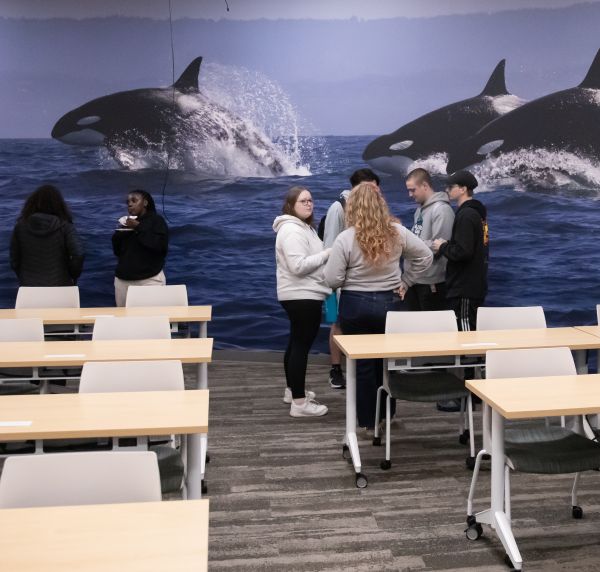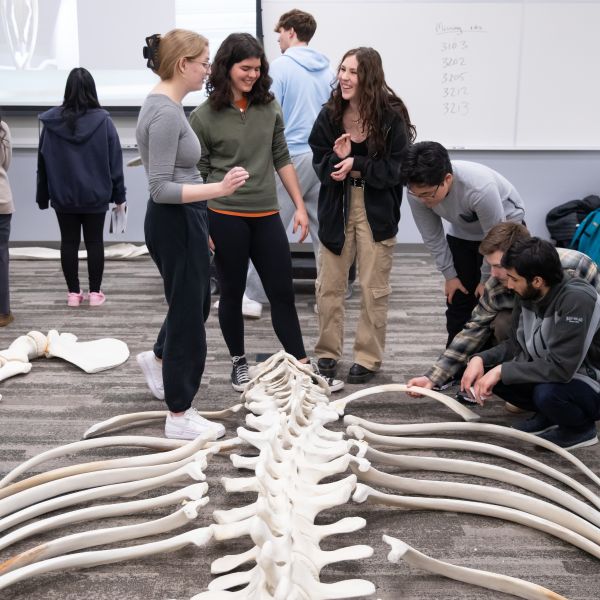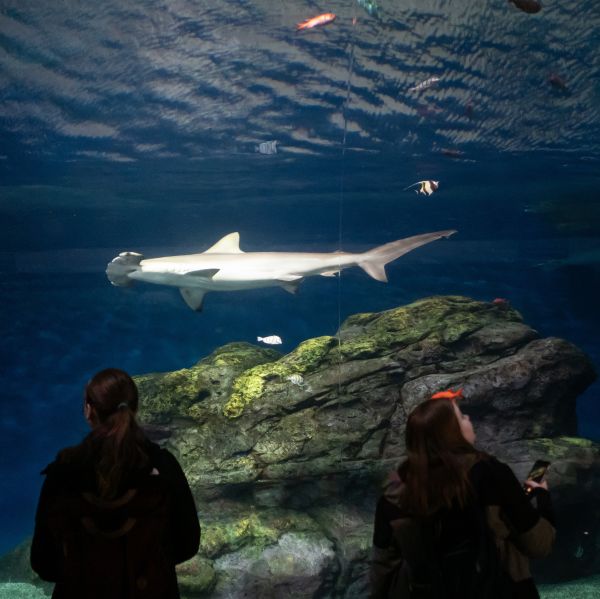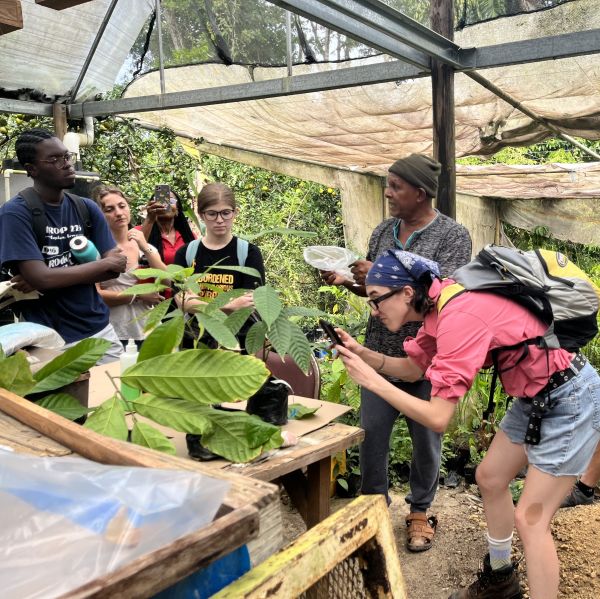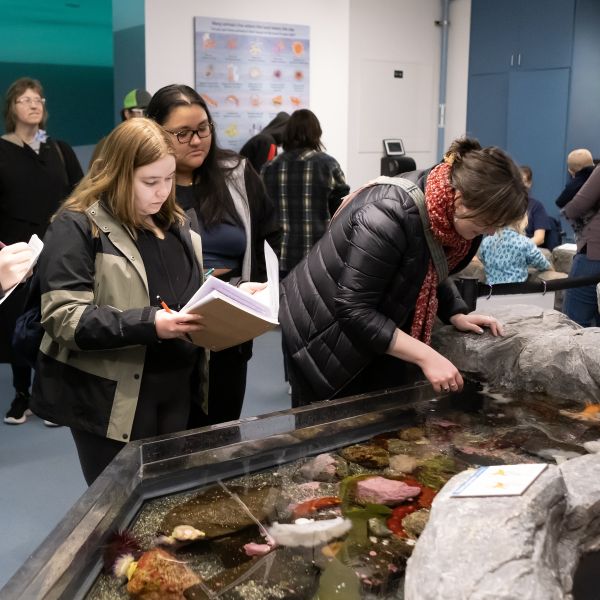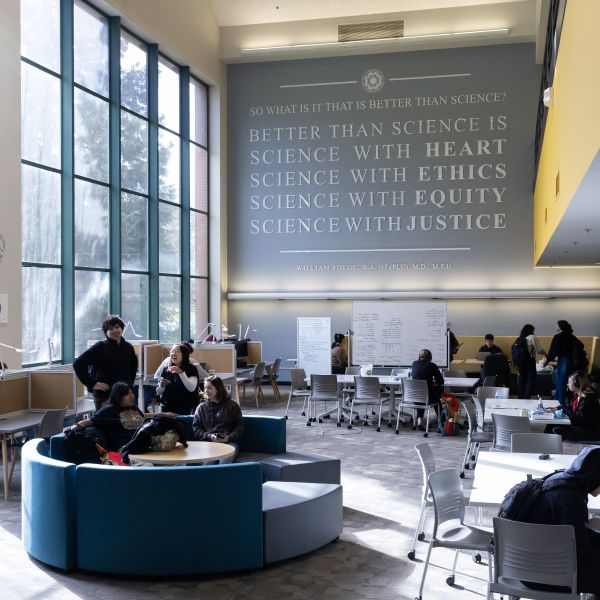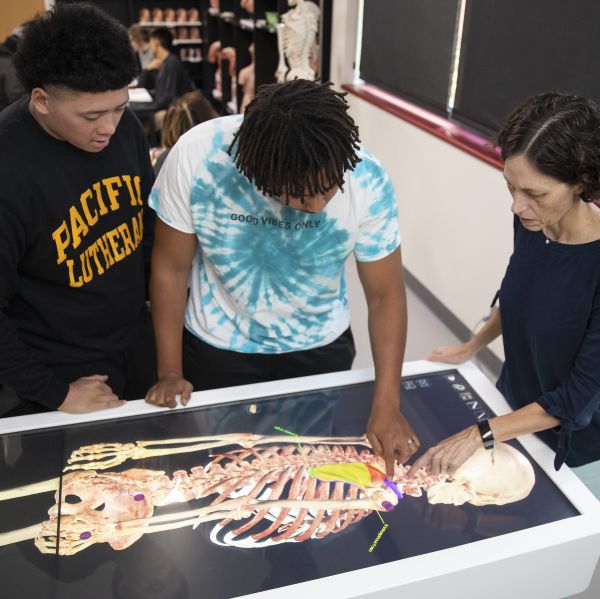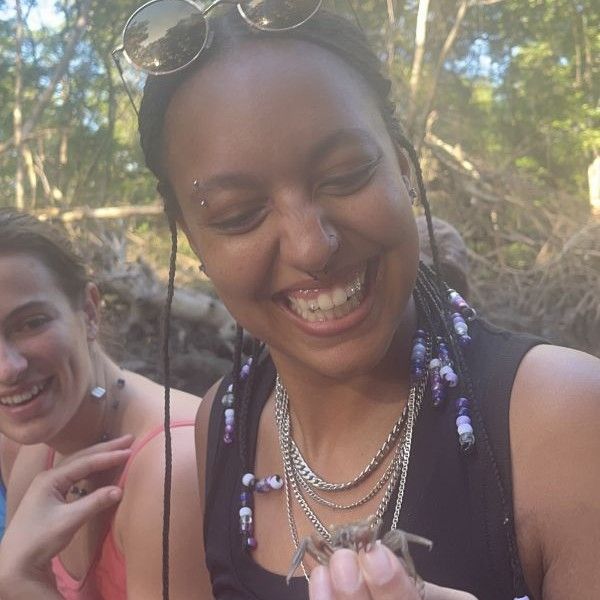Biology
Undergraduate Major & Minor College of Natural Sciences
Bachelor of Science, Bachelor of Arts
Biology at PLU Transcription
(piano music)
[video: An introductory slideshow of different videos plays as Dr. Michael Behrens begins speaking. The first video shows students walking around campus during a common passing period. The second shows students in vests navigating through the brush of a wooded area. The final clip shows a class in progress, with the lecturer speaking at the front of the classroom.]Dr. Michael Behrens, Professor of Biology: Our biology major is best suited for students with a wide range of interests. That could be pre-professional health, conservation biology or ecology, even wanting to teach at various levels.
[video: Dr. Behrens sits in a Biology classroom speaking to the camera.]Dr. Behrens: It’s really a broad based background or education that will allow you to do multiple things.
[video: Dr. Behrens’ voice continues over a video clip of him talking to students outside by a large body of water. The camera pulls close on a starfish in his hand, as he shows students its different parts.]Dr. Behrens: Our faculty are really committed to working with our students, and doing that face to face, one-on-one.
[video: Emma Janousek sits in a Biology classroom, speaking to the camera.]Emma Janousek, Former Biology Student, Class of 2020: The faculty at PLU really set an example for me as a future educator, in terms of how to both challenge your students, and then also just invest in them as people.
[video: Emma’s voice continues over the video of Dr. Behren’s showing starfish to students along the waterfront.]Emma: And I think that wouldn’t be possible elsewhere, besides PLU, given the small class sizes.
[video: Return to Emma sitting in the Biology classroom talking to the camera]Emma: Like that really allows for that teacher-student connection that’s really awesome, and really gives students confidence moving forward in their future.
[video: Fade to black][video: Return to Dr. Behrens sitting in the Biology classroom talking to the camera]
Dr. Behrens: Biology students at PLU have the opportunity to continue their biology education through study abroad opportunities.
[video: As Dr. Behrens describes study abroad opportunities, his voice continues over a montage of clips from the different locations he’s describing. The first clip is of the University of Namibia, displaying the outside, and then students working in the lab inside the building. Then, a video of the school in Norway with similar clips. Lastly, the outside of the school in Trinidad and Tobago and a clip of a lecturer inside.]Dr. Behrens: You have opportunities to go places like Namibia, or Norway and the University of Southeast Norway. Also the University of West Indies in Trinidad and Tobago. And those all give students opportunities to develop their upper division courses, while studying abroad and living abroad.
[video: Dr. Behren’s voice continues over a montage of different classrooms in sessions, lecturers speaking and fostering class discussion, and clips of students working in labs.]Dr. Behrens: The major also provides flexibility for students to take a range of different classes, to satisfy their requirements, which really allows them to take classes that they’re interested in, and still prepare them as a broad based biologist.
[video: Hayden Cross-Schroder sits in a Biology classroom, speaking to the camera.]Hayden Cross-Schroder, Biology Student, Class of 2021: I think I was really narrow-minded with what biology was when I came in.
[video: Hayden’s voice continues over clips of plants outside: sprouts and tree branches in the sun.]Hayden: They really prepare you to look at the world around you. There’s biology in almost everything, and there’s definitely science in everything. And so I’ve been able to apply a lot of the concepts that I learn in class to my everyday life, and I get to see them in action, and that’s really exciting, and one of the things that I love about science and biology.
[video: Emma’s voice over more video of classes being taught.]Emma: I found interdisciplinary connections between biology and philosophy, or the music class I had to take. There’s so many connections there. I really feel like the liberal arts education has kind of broadened my perspective, and that’s really gonna help me serve students in the future. It really helps me view biology through an equity lens as well.
[video: Fade to black][video: Emma and Hayden’s voices over a montage of students in the lab, then outside in nature investigating samples they collected. Then, another clip of Dr. Behrens, this time in a forest by a waterway, talking to a student. After that, a slow pan of building with the words Pacific Lutheran University on the front.]
Emma: I have always wanted to be a teacher. I didn’t necessarily like science growing up, but I was like, “Oh, let me just try out science. You know, that will be a good way to get a teaching job”. And then I ended up loving it, like beyond just, “Oh, I’m going to teach this”. I really kind of found a passion for biology.
Hayden: They’ve made me feel like a really integral part of the community. PLU has really come to feel like home, in especially the biology department. I have a lot of connections with professors, because of my jobs to TAing, and I’m also a biology tutor, and I’ve done research, and I’ve been a lab assistant and a prep worker. So I really got to work closely with the faculty in the biology department. And it’s been really nice getting to see them as people, you know, and hear about their lives and their stories.
(gentle music)
About:
Biology at PLU isn’t just about what you know – it’s about how you think. Here, you won’t just memorize terms or study diagrams. You’ll learn how to observe, question, and investigate the world around you, whether you’re out in nature or analyzing cells under a microscope.
You’ll dive into biology through hands-on learning, including weekly labs, real research, and plenty of opportunities to explore your own ideas. You’ll read scientific studies, write lab reports, and present your findings, all while building a strong foundation in core biological concepts and digging deeper into the topics that spark your curiosity.
Our biology professors are full-time teachers and active researchers studying everything from bacterial infections and plant biology to songbird evolution. You’ll be encouraged to join their projects – or even design your own.
The curriculum is designed for both breadth and depth, preparing you for careers in medicine, research, public health, education, and more.
Skills you'll gain from this program:
- Scientific Inquiry & Experiment Design — Learn how to ask meaningful questions, design experiments, and collect and analyze data to uncover how living systems work.
- Laboratory Techniques — Gain hands-on experience with tools like microscopes, DNA extraction, gel electrophoresis, and microbial culture — skills used in research, medicine, and biotechnology/
- Data Analysis & Interpretation — Practice using statistics, modeling, and critical reasoning to interpret results and draw evidence-based conclusions.
- Field Research & Ecological Observation — Study plants, animals, and ecosystems in natural settings, developing skills in sampling, identification, and environmental analysis.
- Scientific Communication — Learn how to write lab reports, present findings, and explain complex biological concepts clearly to both scientific and general audiences.
- Collaboration & Research Application — Work alongside faculty mentors and peers in lab and field projects that mirror real-world scientific teamwork and discovery.
Graduates from the last 5 years: Their jobs
- Environmental Health Technician, Pierce County Health Department
- Microbiologist, Water Management Laboratories
- Pharmacy Technician, Island Pharmacy
- Biology Teacher, Juanita High School
- Research Technician, Fred Hutchinson Cancer Research Center
- Genomic Epidemiologist, Utah Department of Health and Human Services
- Community Outreach and Engagement Manager, Douglas Land Conservancy
Graduates from the last last 5 years: Their graduate programs
- Doctor of Medicine, Oregon Health Sciences University
- Doctor of Veterinary Medicine, University of Pennsylvania
- Doctor of Pharmacy, University of Southern California
- Master of Public Health, Rutgers School of Public Health
- Master of Science in Biotechnology, Johns Hopkins University
- Master of Science in Environmental Biology, Regis University
- Master of Conservation Leadership, Colorado State University
It’s FREE to apply to PLU
When you're ready, we're here. Apply now and fulfill your potential!
Get StartedTop 10 Best Colleges for Biology in Washington - Niche
97% of 2024 Biology grads reported employment or acceptance into graduate school within 6 months of graduating.
Study Away
Biology students have spent semesters studying in Namibia, Scotland, Mexico, Norway, Trinidad & Tobago, New Zealand, and there’s even a Marine Biology study away class in the Bahamas during our January term, taught by a PLU professor!
Internships with an Impact
PLU biology students have interned at The Fred Hutchinson Cancer Center, the Seattle Biomedical Research Institute, Tacoma’s Point Defiance Zoo and Aquarium, and more.
